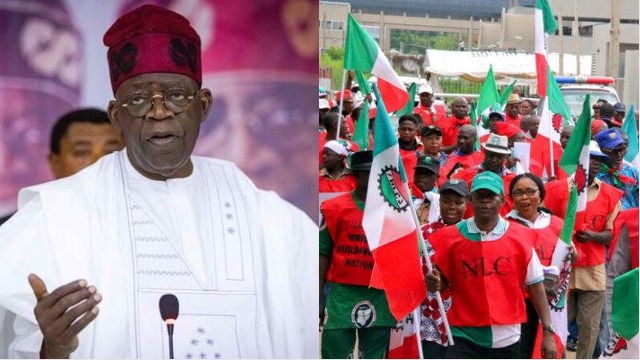The federal government yesterday made an incremental adjustment to the minimum wage offer, moving from N60, 000 to N62, 000 while the organised labour comprising the Nigeria Labour Congress (NLC) and the Trade Union Congress (TUC) reduced its demand from N494, 000 to N250, 000.
The governor of Imo State, Mr Hope Uzodinma, who spoke on behalf of the governors, announced this at the end of the two-day meeting of the tripartite committee on minimum wage in Abuja yesterday.
“The committee has worked so hard and the committee has reached an agreement. The tripartite committee is made up of three parties – the government, the organised private sector, and organised labour.
“In the wisdom of the committee, it has put together a recommendation that will be forwarded to Mr President for further action
“The organised private sector and the federal government have agreed on N62, 000 while the organised labour is asking for N250, 000.
“At the end of the day what is important is that we are talking. There is no hostility anymore. And the national anxiety is going to be relaxed as soon as this is made public. That is the beauty of the conversation and I am very happy we have been able to manage this temptation that has befallen our nation so that government can face their business and Nigerians will also go about their businesses without any further embarrassment,” he said.
The president of TUC, Mr Festus Osifo also confirmed the federal government’s new offer saying: “The organised private sector and the federal government have recommended N62, 000 as the minimum wage but for us, we felt that with the current economic hardship and the difficulty in the land, the sum of N250, 000 should be what will be okay for the minimum wage.
“We are going to sign a report and forward this position to Mr President. This committee is to make a recommendation to Mr President…and Mr President will forward it to the national assembly.
“We will keep pushing to ensure that we have a wage that stands the test of time in Nigeria.
For his part, the chairman of the tripartite committee, Mr Goni Aji, said what the parties arrived at was the product of a “very deep dialogue and consensus.”
The situation that we are recommending to Mr President, somehow, is repeating itself because it happened in the 2018 exercise.
“In 2018, it was the other way. The organised private sector and the organised labour recommended N30, 000 as minimum wage while the government side recommended N24, 000.
“Two figures were recommended to the then president for his consideration and onward transmission to the national assembly for it to become a law. That is exactly where we are.
“The mandate of the tripartite committee is to recommend. It has no powers to approve but to recommend and the recommendation today came as a result of deeper understanding and studies of all the economic indices and current inflation, state of the economy, affordability, ability, capability, and sustainability that had been displayed so that a figure that will further throw the country into confusion is not announced. This is because if any party goes into an agreement of the figures it knows from its sources it cannot afford then it is going to create another problem,” he added.
Earlier, the state governors under the aegis of the Nigeria Governors’ Forum had rejected the federal government’s N60, 000 offer.
While the negotiation was going on, the governors said they could not even pay the N60, 000 minimum wage which the federal government had proposed earlier.
The NGF’s position was contained in a statement entitled ‘The forum’s stand on the N60, 000 minimum wage not sustainable – NGF’ and issued yesterday by its acting spokesperson, Mrs Halimah Ahmed.
The statement reads: “The Nigeria Governors’ Forum (NGF) agrees that a new minimum wage is due. The Forum also sympathises with labour unions in their push for higher wages.
“However, the Forum urges all parties to consider the fact that the minimum wage negotiations also involve consequential adjustments across all cadres, including pensioners. The NGF cautions parties in this important discussion to look beyond just signing a document for the sake of it; any agreement to be signed should be sustainable and realistic.
“All things considered, the NGF holds that the N60, 000 minimum wage proposal is not sustainable and cannot fly. It will simply mean that many states will spend all their FAAC allocations on just paying salaries with nothing left for development purposes. In fact, a few states will end up borrowing to pay workers every month. We do not think this will be in the collective interest of the country, including workers.
“We appeal that all parties involved, especially the labour unions, consider all the socioeconomic variables and settle for an agreement that is sustainable, durable, and fair to all other segments of the society who have a legitimate claim to public resources.”
Recall that on Monday, the NLC and TUC embarked on an indefinite nationwide strike over the federal government’s failure to meet their demand for a new minimum wage.
On Tuesday, they called off the industrial action for one week to allow negotiations with the federal government on a new minimum wage.


























































